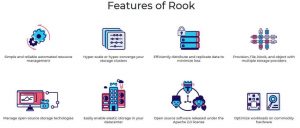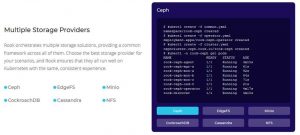Upbound: Availability Of Rook 1.0, Open-Source Cloud-Native Storage for Kubernetes
Uses power of Kubernetes platform to turn distributed storage systems into self-managing, self-scaling, self-healing storage services
This is a Press Release edited by StorageNewsletter.com on May 17, 2019 at 2:07 pmUpbound, company behind open source projects Rook and Crossplane, announced a release of Rook 1.0, extending the Kubernetes ecosystem.
![]()
“Rook 1.0 is a major milestone for the project and the cloud-native open-source community,” said Bassam Tabbara, CEO, Upbound, and maintainer on Rook. “We would like to thank the hundreds of contributors to the project, which has recently surpassed 5000 stars & has over 40 million container downloads. With Rook, customers are deploying and managing production grade storage in their Kubernetes environments. As the adoption of Kubernetes and its ecosystem grows, we will be investing further to extend Kubernetes to automate the provisioning and management of new types of services that users depend on.“
Click to enlarge
Rook uses the power of the Kubernetes platform to turn distributed storage systems into self-managing, self-scaling, self-healing storage services. It automates the tasks of a storage administrator: deployment, bootstrapping, configuration, provisioning, scaling, upgrading, migration, DR, monitoring, and resource management.
Rook 1.0 highlights:
-
Ceph Nautilus – The Ceph operator supports the latest version, Nautilus, alongside Mimic and Luminous. Feature additions and enhancements in security, automated scaling and upgrades bring further production-level functionality to Rook-managed Ceph.
-
EdgeFS – It adds production-ready support and updated management experience with a new GUI, performance enhancements and Prometheus integration. Two new storage protocols, OpenStack Swift and the iSCSI block storage CSI driver, complement existing S3 support.
-
NFS – Rook’s NFS operator has added dynamic provisioning support, enabling automated provisioning and deployment without any manual intervention.
-
User resources – Rook’s website has been updated, delivering user guides, documentation with a new experience.
“The focus of Rook 1.0 has been production-grade features, making integrated cloud-native storage a practical reality in the Kubernetes ecosystem,” said Jared Watts, founding maintainer, Rook. “With a focus on automation, management & security, infrastructure owners can confidently deploy their choice of underlying storage provider in their cloud-native environments.“
Click to enlarge
Rook is deployed in production, across multiple industries, enabling companies to store, deliver and protect the data that powers their businesses.
“Our business journey with Kubernetes and Ceph started back in 2016, and Rook has been an invaluable addition to the Kubernetes ecosystem. It allowed us to bring up live clusters despite network, disk and node issues with no downtime nor a single bit of data loss,” said Christian Huenung, system architect, figo.io (Figo GmbH), banking service provider. “Its notable that not a single Rook update to our multi-cluster production environment has caused any downtime or data issues for us, which has built a lot of trust in the solution and community over time.“
“Ceph Nautlius brings many additional features to the project, with a strong focus on security and lifecycle management,” said Sage Weil, leader, Ceph project, and distinguished engineer, Red Hat, Inc. “Customers can confidently deploy Ceph using the Rook operator in production, and run at scale.“
If you’re attending KubeCon, Cephalocon or CloudNativeCon Europe next month, stop by and visit the company and Rook booths as well as check out the Crossplane and Rook talks.
Resource:
More on the CNCF, Rook, Upbound, and Crossplane websites, and get involved in the communities on GitHub or Slack.
Read also:
$9 Million Series A for Unbound Led by GV (Formerly Google Ventures)
Rook cloud storage project backer
May 11, 2018 | Press Release















 Subscribe to our free daily newsletter
Subscribe to our free daily newsletter

